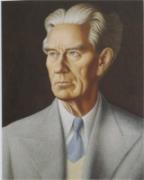|
|
||||||||||||||||||||||||
 |
Featured person
Recently added |
William Copeland Trimble (1851 - 1941): |
||||||||||||||||||||||
William Copeland Trimble was a member of the second generation of a dynasty who owned and ran the newspaper, The Impartial Reporter, in Enniskillen, County Fermanagh. The paper had been first printed by his father, also William Trimble, in 1825, and who became owner in 1834 and the paper is still published in the 21st century making it the third-oldest newspaper in Ireland after two other Ulster publications, the Belfast News Letter (which is the oldest daily newspaper in the world) and the Derry Journal. However, no other newspaper in the British Isles was held in the hands of one family for so long: in a further three generations after William Copeland Trimble.
Trimble was educated at the prestigious Portora Royal School in Enniskillen (which also produced Oscar Wilde and Samuel Beckett) and afterward tried his hand at various careers, as a barrister and a tenor singer, but shone when he joined the newspaper, the father impressed favourably by the son’s writing and printing skills declaring him the equal of all journalists; paternal pride and possible exaggeration apart (William Trimble was not one for understatement), William Copeland’s writing was admired for its facility. Politically he was not so much impartial, as taking positions on two of the leading questions of the time which were not very commonly found together: he was firmly behind the rights of small farmers (he founded the Fermanagh Tenant Right Association on 22 December 1881 and acted as county secretary for a number of years) which made him few friends amongst wealthy landed interests; he was though not in favour of Irish part-separatism or Parnellite Home Rule, and regarded the Irish Land League disfavourably. (The Land League founded in Mayo in 1879 to protest against unaffordable rents and the landlord system of landholding; its first President was Charles Stewart Parnell, the politician later disgraced in a sex scandal which shocked Catholic Ireland.)
Copeland Trimble had a high political profile. He took a Unionist position in relation to Home Rule – opposing a parliament for Ireland in Dublin, and was a supporter of Sir Edward Carson’s campaign in the years before the First World War against such a body, raising a troop of mounted horse from Enniskillen as part of the Ulster Volunteer Force of the time. Carson’s campaign in fact began in Enniskillen, on September 18th 1912, when he and the Earl of Erne were was met at Castlecoole by a troop of 200 horse specially formed and led by Trimble himself; they escorted them through Enniskillen to the Town Hall. This was the biggest public demonstration ever to have been held in Enniskillen, perhaps surprising as theretofore Fermanagh Unionists had according to Trimble been relatively low key in their opposition to the Home Rule Bill which had been presented earlier in the year. Be that as it may, 40,000 members of Unionist Clubs paraded that day.
Copeland Trimble ran The Impartial Reporter (or simply the Reporter as it was commonly known) from 1883 (though for a few years it still was officially under the leadership of William senior). He was not averse to involving other family members, but like his father somewhat, insisted on being in sole charge; his half-brother Samuel Delmege Trimble was excluded from involvement (though with no rancour; support was given to him in his own newspaper enterprises in Donegal and Armagh.) In November 1901 a potential catastrophe occurred when a fire destroyed the Trimbles’ printing works; production was relocated to Omagh, County Tyrone for six months but under Copeland Trimble’s energetic management, the Reporter returned home in May 1902.
William Copeland Trimble published a substantial work, The history of Enniskillen with reference to some manors in co. Fermanagh : and other local subjects, which was published in three volumes between 1919 and 1921. one of the most substantial Irish local histories of the century. He died 24 January 1941 in Fermanagh county hospital after suffering a stroke. He is buried in Breandrum cemetery, Enniskillen.
| Born: | 8 November 1851 |
| Died: | 24 November 1941 |
| Richard Froggatt |
| Acknowledgements: Professor Sir Peter Froggatt |
| Bibliography: Dictionary of Irish Biography; Jonathan Bardon: A History of Ulster; “Carson's Home Rule opposition began in Enniskillen”, www.impartialreporter.com, 8.12.2011 |


Home | Our Policies | Plaques | Browse | Search | Sponsors | Links | Help | Contact
Privacy & Disclaimer | Cookie Policy | Site Map | Website Design By K-Point
© 2024 Ulster History Circle









